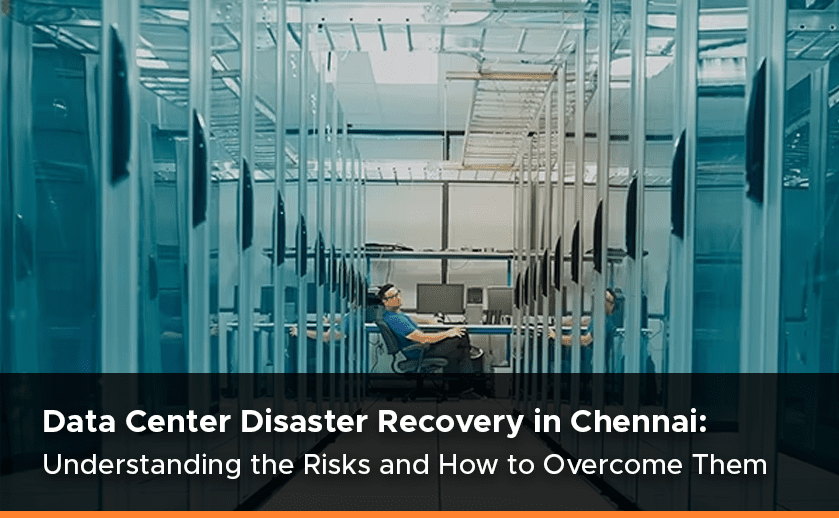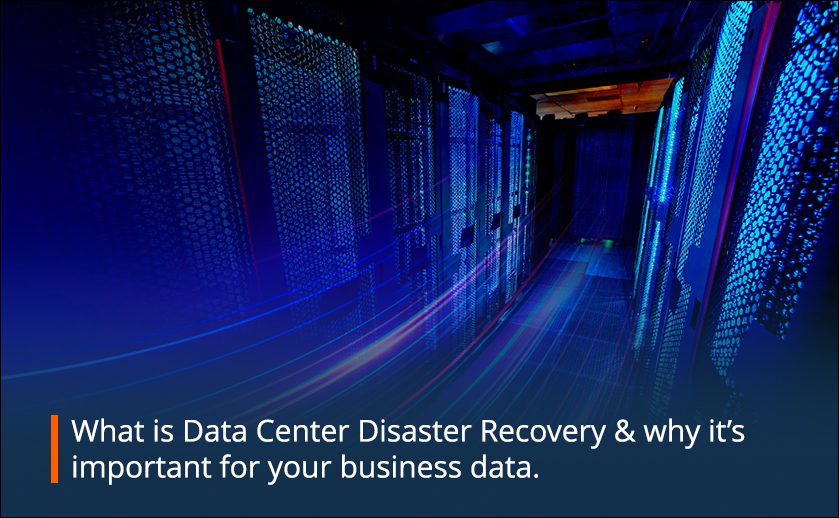Introduction
In the age of digital technology, data has become the lifeblood of businesses of all sizes. However, with the increasing reliance on data comes the risk of data loss or corruption due to natural disasters, cyberattacks, or other unforeseen events. This is where data center disaster recovery comes in. In this blog, we’ll take a deeper look at data center disaster recovery in Chennai, the challenges people face with data at risk, and how businesses can overcome these problems to protect their data.
What is Data Center Disaster Recovery?
With businesses relying heavily on data to operate and thrive, be it customer information, financial records, or product inventory, data is essential to the daily operations of most businesses. Unfortunately, data is also vulnerable to a range of threats, including natural disasters, cyberattacks, and hardware failure.
Data center disaster recovery is a comprehensive set of processes and procedures that businesses use to recover their IT infrastructure and data in the event of a disaster. This can include everything from creating a disaster recovery plan to regular data backups and offsite storage. The goal of data center disaster recovery is to ensure that a business can recover its critical IT systems and data quickly and effectively, minimizing downtime and data loss.
One of the most critical components of data center disaster recovery is the disaster recovery plan. This plan outlines the steps that will be taken to recover critical IT systems and data in the event of a disaster. It should include information on who will be responsible for what tasks, how data backups will be stored and accessed, and how the business will communicate with employees, customers, and other stakeholders during the recovery process.
What are the Challenges that Businesses Face with Data at Risk?
When data is at risk due to a disaster, there are several challenges that businesses may face. Let’s have a deeper look:
Risk of losing critical data
When data is at risk, the biggest challenge people face is the potential loss or corruption of valuable data. This can result in significant financial losses, damage to the company’s reputation, and even legal liability.
Cost of implementing disaster recovery measures
Implementing the necessary infrastructure and processes for disaster recovery can be expensive, which may be a significant barrier for smaller businesses or those with limited budgets.
Availability of data during recovery efforts
When data is stored off-site, it may take time to retrieve it and restore systems, resulting in extended downtime. If data is not backed up regularly, some data may be lost permanently, which can be particularly devastating for businesses that rely on it for operations or decision-making.
Potential for extended downtime and lost productivity
When data is at risk, businesses may experience extended downtime, resulting in lost productivity and revenue. This can be particularly damaging for businesses that rely heavily on data and IT systems.
Need for regular testing and updating of disaster recovery plans
Disaster recovery plans must be regularly tested and updated to ensure that they are effective in the event of a disaster. This can be time-consuming and require specialized expertise, which may be a challenge for some businesses.
Data Center Disaster Recovery in Chennai: Helping Businesses Overcome These Problems
Fortunately, there are several steps businesses in Chennai can take to overcome the challenges associated with data center disaster recovery. To overcome these challenges, following steps may help
Implement a disaster recovery plan
Businesses can implement a comprehensive disaster recovery plan to help mitigate the risks associated with data loss or corruption. The plan should include procedures for backup and recovery of data, as well as designated individuals responsible for specific tasks in the event of a disaster.
Regularly test and update the disaster recovery plan
To ensure the effectiveness of the disaster recovery plan in Chennai, it is important to test and update it regularly. This will help to identify and address any weaknesses in the plan and ensure that it is up to date with the latest technologies and best practices.
Consider cloud-based disaster recovery solutions
These solutions can offer a more cost-effective and scalable approach to disaster recovery and allow businesses to store and recover data in the cloud, which can be accessed from anywhere, anytime.
Ensure access to data during recovery efforts
To ensure that data is available during recovery efforts, businesses should consider implementing redundant data storage systems and ensuring that data is backed up regularly. This will help to ensure that critical data can be restored quickly and with minimal disruption to business operations.
Foster effective communication and decision-making
To ensure effective communication and decision-making during recovery efforts, businesses in Chennai should establish clear lines of communication and designate individuals responsible for specific tasks. Regular training and drills can also help to ensure that employees are prepared and able to respond effectively in the event of a disaster.
By taking these steps, businesses in Chennai can overcome the challenges associated with data at risk and ensure that critical data is protected and available when it is needed most.
Conclusion
Data center disaster recovery is crucial for protecting against unexpected downtime and data loss. Understanding the potential risks associated with data loss and implementing comprehensive disaster recovery plans is crucial for minimizing downtime, protecting valuable data, and ensuring that businesses can continue operating in the event of a disaster.
At Orisenc, we offer comprehensive disaster recovery services to help businesses in Chennai and beyond prepare for and overcome potential disasters. Contact us today to learn more about how we can help you safeguard your digital assets and maintain business continuity in the face of unexpected challenges.
FAQs
1. What is data center disaster recovery, and why is it essential?
Data center disaster recovery refers to the process of restoring data and IT systems following a natural disaster or other disruptive event. It involves implementing a comprehensive disaster recovery plan that includes procedures for backing up and restoring data and identifying critical applications and systems that must be restored first. Disaster recovery is essential because it helps to ensure that businesses can recover from disasters quickly and with minimal disruption to operations.
2. What are some common causes of data loss and how can they be prevented by data center disaster recovery in Chennai?
Some common causes of data loss or corruption in Chennai include natural disasters, power outages, hardware failure, and cyber-attacks. To prevent data loss or corruption, businesses can implement measures such as regular data backups, redundant data storage systems, and robust cybersecurity protocols.
3. What are the benefits of cloud-based disaster recovery solutions?
Cloud-based disaster recovery solutions offer several benefits, including cost-effectiveness, scalability, and remote accessibility. These solutions allow businesses to store and recover data in the cloud, which can be accessed from anywhere, anytime, and can also help to reduce infrastructure costs associated with traditional disaster recovery solutions.
4. How often should businesses test and update their disaster recovery plans?
Businesses should test and update their disaster recovery plans regularly to ensure their effectiveness in the event of a disaster. This may include conducting regular drills and training exercises, as well as updating the plan to reflect changes in technologies or business processes. The frequency of testing and updating will depend on the size and complexity of the business, but generally, it is recommended to conduct testing at least once per year.



